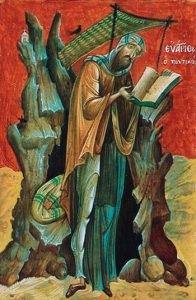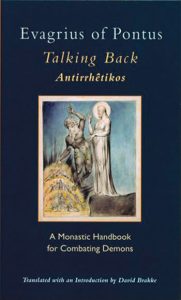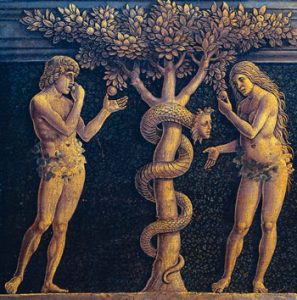A School for Prayer (9)
Evagrius of Pontus (346—399)
and the Eight ‘Thoughts’
By Fr Craig Larkin SM, 1943 - 2015
Hardly known in the West, Evagrius of Pontus nevertheless is one of the most significant influences on spirituality in both East and West.
Evagrius belongs to the third generation of Desert Fathers. His spiritual father was Macarius the Great. And Macarius was the spiritual son of Anthony of the Desert.
Evagrius was the first of the Desert Fathers to construct a theology of the spiritual life and to describe the ‘mechanics’ of the spiritual journey. He was the first to provide an understanding of the psychology of the human person’s journey to God. Fifteen hundred years before Freud or Jung, he had realized the significance of dreams in human life.
He is recognised as a master of the spiritual life.
And yet in the West he is scarcely known because, like many great figures of the East, he was forgotten by the West after the split in the Church between East and West.
Even in the Eastern Church he was, for a long time, regarded with suspicion, because he was a disciple of Origen, some of whose writings were condemned. Evagrius’ writings continued to be read in the East, but they were attributed to other writers, particularly Nilus of Sinai.

Evagrius of Pontus
Evagrius the monk
Evagrius was born in Ibora in Pontus, today’s northern Turkey, in 346. He was ordained lector by St Basil the Great, and a deacon by St. Gregory of Nazianzen.
He was set for a brilliant intellectual career, but an affair with a noble woman led him to flee to Jerusalem, where he stayed in a monastery for men and
women run by the famous Melania and Rufinus.
Soon, however, pride and ambition got the better of him, and he became intoxicated with his self-importance.
Then he was struck by a strange illness. Melania suspected the illness might be rooted in his spiritual state. She urged him to look at himself honestly. He did so, and found healing. He then retired to the desert of Egypt, where he spent the rest of his life.
To the end of his life he struggled with his personal demons, particularly with sexuality and vanity.
Perhaps his honest self-examination gave him a clue to the inner workings of the human psyche.
A prolific writer
He left behind a large body of writings, particularly on prayer and the ascetical life.
His chief writings include:
The Foundations of the Monastic Life and To Eulogius, which deal with the beginnings of the monastic vocation; On the Vices, On the Eight Thoughts, and Praktikos, which deal with the spiritual struggle; Ad Monachos, a series of 137 proverbs addressed to monks; and his Chapters on Prayer. He also wrote an interesting work, Antirrheticos, which provides Scripture texts the monk can use in warding off temptations.
Though his works on prayer are very significant, in these articles we focus more on his ascetical teaching.
The human vocation
Evagrius’ view of the goal of human life followed the lines that the earliest theologians of the Church had formulated.
1. The human person is made in the image and likeness of God (cf Gensis 1:26)
2. The image of God implanted in the human person can never be lost. It comes from the fact of creation. This is the basis of our dignity as humans.
3. The likeness of God in the human person can be lost, and it is lost through sin. It can be regained through conversion of heart.
4. The goal of every human person is to be divinised, to become like God -- Theosis. St Athanasius wrote: God became man so that man could become God. The earliest Christians believed this in an almost literal way.
5. We reach this goal of divinisation through the working of God’s grace and the ascetical struggle.
 The big question
The big question
But Evagrius’ reflection on his own spiritual state, and his experience with other monks, led him to ask the question:
If we are made in the image and likeness of God; and if we are called to be ‘like God’ and divinised; and if a monk with such generosity goes into the desert to find God and live for God, then how is it that he can lose his nerve and is so often tempted to ‘drop out of the fight’ and settle for less in the Christian life?
Evagrius offers a response, based on the way the early Fathers understood the way the human person works.
The human person
The human person is made up of two elements:
Body -- the physical element, operating through the 5 senses and the passions of the body
Soul -- the ‘spiritual’ element which operates through three ‘powers’:
The rational part - which drives our thinking
The concupiscible part - which drives our bodily desires
The irascible part -- which drives our mental desires
In the state before the Fall, these two elements, the body and the soul, worked in harmony; and each of the three powers of the soul worked in harmony and balance. With the Fall of Adam and Eve, a split, or ‘civil war’ arose between these elements.
In the ‘divinised person’ or the saint, harmony is restored, through grace on the part of God, and human effort or asceticism on the part of the individual.
What causes the ‘civil war’
inside us?
So, what is it that causes this civil war, or split, between the elements?
Evagrius said that there were four sources of trouble:
Demons
Events
Passions
Thoughts
Demons
Evagrius has no trouble recognising that in the world there are forces of good and forces of evil. He is not obsessed about demonic forces, but he recognises their presence. However, demons are external to us, and can be avoided.

Adam and Eve committing original sin,
Detail from The Virgin of Victory,
Andrea Mantegna, 1496
Events
By this, Evagrius means the things that happen around us: political events, economic crises, deaths of loved ones, the actions and behaviours of others. These also are external to us and do not necessarily have the power to affect us.
Passions
Passions are internal to us; we carry them around with us wherever we go. They are connected either with the needs of our bodies -- arising from the body’s material needs such as the need for nourishment, shelter and clothing, love; or with the needs of our soul -- arising from the soul’s desire for independence, for knowledge, for recognition.
Thoughts
Thoughts are the most significant things for Evagrius, and he considers that these are at the beginning of difficulties for anyone on the spiritual journey. What causes us trouble is not our feelings or even our actions, but first of all our thoughts.
 Entries(RSS)
Entries(RSS)